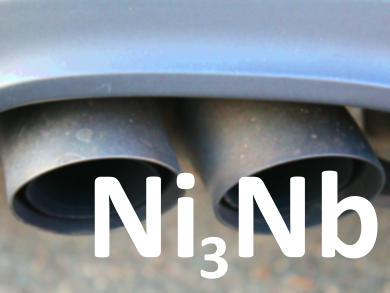Modern cars have catalytic converters which remove some of the harmful gases generated during combustion from the car’s exhaust. They catalyze the oxidation of toxic CO to CO2 and the reduction of harmful nitrogen oxides (NOx) to N2. Commercially available catalytic converters use precious metals such as platinum, palladium, or rhodium to achieve this effect, which makes them expensive. Replacing these metals with cheaper transition metals has been difficult due to catalyst poisoning by the adsorption of nitrogen and insufficient thermal stability.
Takeshi Fujita, Tohoku University, Sendai, Japan, Hideki Abe, National Institute for Materials Science, Tsukuba, Japan, and colleagues have prepared a nickel-niobium alloy (Ni3Nb) which can remediate NO emissions efficiently. The team used arc melting in an argon atmosphere to prepare Ni3Nb ingots from the elements and powdered the resulting material. The powder was used as a catalyst in a gas-circulation reactor, which circulated CO and NO at 325 °C. The material removed 96 % of the NO gas within 11 minutes. Platinum powder, in comparison, removed 7.5 % of the NO gas in 35 minutes. Neither pure Ni nor pure Nb powder showed any remediation activity.
Using scanning transmission microscopy (STEM), the researchers observed a nanophase separation in the alloy when it was exposed to the simulated exhaust gas. The material developed filamentous nickel networks, embedded in a niobium oxide matrix. The team attributes the NO and CO conversion activity to the filamentous nickel, while the niobium oxide adsorbs nitrogen atoms, prevents catalyst poisoning, and improves the material’s thermal stability.
- Nanophase-separated Ni3Nb Alloy as Automobile Exhaust Catalysts,
Toyokazu Tanabe, Tsubasa Imai, Tomoharu Tokunaga, Shigeo Arai, Yuta Yamamoto, Shigenori Ueda, Ramesh V. Gubbala, Satoshi Nagao, Hirohito Hirata, Shin-ichi Matsumoto, Takeshi Fujita, Hideki Abe,
Chem. Sci. 2017.
DOI: 10.1039/c6sc05473k




